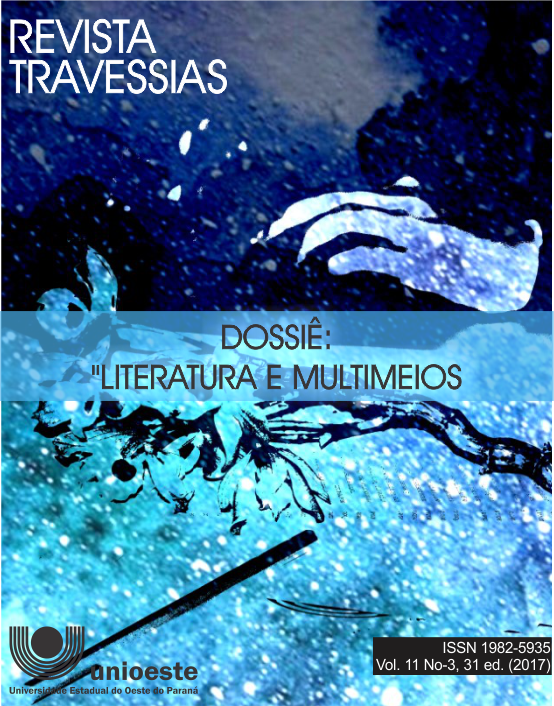Reading in higher education
Keywords:
Reading, search, technology.Abstract
The concern to encourage reading, especially in the academic world, is the focus of this work. To show that there are alternatives that can work, a practical theoretical project is presented by a University of Passo Fundo, which combines research in its activity relating to the subjects of the semester, putting into practice such learning and making use, especially in Portuguese language classes of the digital technologies for the best performance of the work. It can be seen that it is possible to reverse the unsatisfactory picture that presents itself when the student enters higher education without motivation to read, it is enough for the University / Faculty to do its part and the project here reported becomes a possible strategy, with teachers from other areas engaged in the Portuguese Language course, besides having all the academic community. The University needs to show society the importance of reading throughout the student life, so that the student arrives at the graduate level better prepared to effectively become a reader / researcher. Thus, we used qualitative research, seeking mainly subsidies of theorists: Katherine Hayles, Róger Chartier, Lúcia Santaella and Henry Jenkins for the construction of meanings. What is verified by the theories studied and the recorded practice is that by using innovative mechanisms and methods that contemplate reading as soon as the university enters the teaching institution, it is possible to train professional researchers in all areas, since the student needs motivation and this is linked to how the teacher will lead the work.Downloads
References
ALMEIDA, M. E. B. Letramento digital e hipertexto: contribuições à educação. In: SCHLÜNZEN JUNIOR, Klaus (Org.). Inclusão digital: tecendo redes afetivas/cognitivas. Rio de Janeiro: DP&A, 2005.
ANJOS, Valéria Maria Sant’Ana Britto dos. Ênfase à leitura literária na escola: um caminho para formação do leitor crítico. Santo Antônio de Jesus-BA, 2015.
CATTELAN, João Carlos. A leitura na escola: uma tipificação do leitor. Tempo da Ciência, Toledo: Editora Toledo, v.01, n.03, p. 3-10, 1º sem. 1996.
CHARTIER, Róger. Do códex à tela: as trajetórias do escrito. In: Chartier, R. A ordem dos livros: leitores, autores e bibliotecas na Europa entre os séculos XIV e XVIII. Brasília, DF: UnB, 1994. p. 95-111.
CHARTIER, Róger. Língua e leitura no mundo digital: Os desafios da escrita. São Paulo: Edunesp, 2002.
COSTA, Geilson Silva; CASOTTI, Janayna Bertollo Cozer. A produção de hipercontos no contexto do ensino médio: contribuições da prática multiletrada. Colóquio de Estudos Linguísticos; Vitória-ES; v. 1; n. 1; 2016
DAL MOLIN. Beatriz Helena. DO TEAR A TELA: Uma tessitura de Linguagens e Sentidos para o processo de Aprendência. 2003. 214 f. Tese (Doutorado em Engenharia de Produção-Área de concentração em Mídia e Conhecimento)- UFSC. Florianópolis.
FAILLA, Zoara. (Org.). Retratos da leitura no Brasil 3. São Paulo: Imprensa Oficial do Estado de São Paulo: Instituto Pró-Livro, 2012. pp. 93-106.
GUEDES, Paulo Coimbra; SOUZA, Jane Mari de. Não apenas o texto mas o diálogo em língua escrita é o conteúdo da aula de português. In: NEVES, Iara Conceição Bitencourt. (org.) et ali. Ler e escrever: compromisso de todas as áreas. Porto Alegre: UFRGS, 2001.
HAYLES, N. Katherine. Literatura eletrônica: novos horizontes para o literário. São Paulo: Global, 2009.
JENKINS, Henry. Cultura da convergência. 2. ed. São Paulo: Aleph, 2009.
JENKINS, Henry. Cultura da conexão: criando valor e significado por meio da mídia propagável. Tradução Patrícia Arnaud. São Paulo: Aleph, 2014.
LERNER, Delia. Ler e escrever na escola. O real, o possível e o necessário. Porto Alegre. Artmed. 2002.
LÉVY, Pierre. Cibercultura. São Paulo: Editora 34, 1999.
LÉVY, Pierre. O que é virtual? São Paulo: Editora 34, 2010.
MAIA, Rosane Tolentino. A importância da disciplina de metodologia científica no desenvolvimento de produções acadêmicas de qualidade superior. Revista Urutaguá, PR, n. 14, 2008.
PETIT, Michèle. Os jovens e a leitura: uma nova perspectiva. São Paulo: Ed. 34, 2008.
ROSING, Tânia Mariza Kuchenbecker. Esse Brasil que não lê. In: FAILLA, Zoara. (Org.). Retratos da leitura no Brasil 3. São Paulo: Imprensa Oficial do Estado de São Paulo: Instituto Pró-Livro, 2012. pp. 93-106.
SANTAELLA, Lucia. Navegar no ciberespaço: o perfil do leitor imersivo. São Paulo: Paullus, 2004.
SANTAELLA, Lucia. Comunicação ubíqua. Repercussões na cultura e na educação. São Paulo: Paulus, 2013.
ZILBERMAN, Regina. A leitura e o ensino da literatura. Curitiba: IBPEX, 2012.
Downloads
Published
How to Cite
Issue
Section
License
Creative Copyright Notice
Policy for Free Access Journals
Authors who publish in this journal agree to the following terms:
1. Authors keep the copyright and grant the journal the right of first publication, with the work simultaneously licensed under the Creative Commons Attribution License, which allows sharing the trial with acknowledgment of authorship and initial publication in this journal.
2. Authors are authorized to take additional contracts separately, for non-exclusive distribution of the work version, published in this journal (eg publish in institutional repository or as a book chapter), with acknowledgment of authorship and initial publication in this journal.
3. Authors are allowed and encouraged to publish and distribute their work online (eg in institutional repositories or on their personal page) at any point before or during the editorial process, as this can generate productive changes, as well as increase both impact and citation of the published trial (See The Effect of Free Access).
Creative Commons License
This work is licensed under a Creative Commons Attribution–NonCommercial-shareaswell 4.0 International License, which allows you to share, copy, distribute, display, reproduce, completely or part of the work, since there is no commercial purpose, and authors and source are cited.



